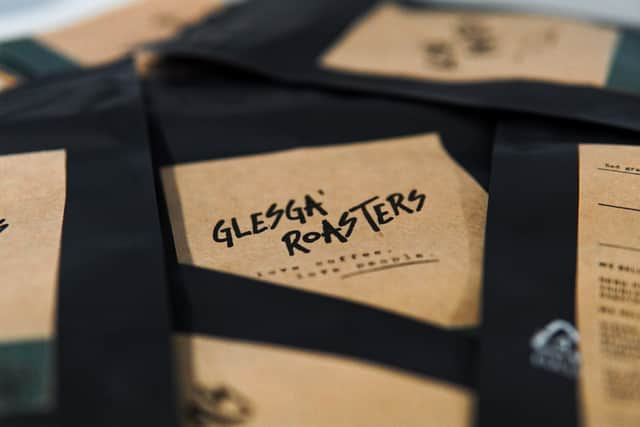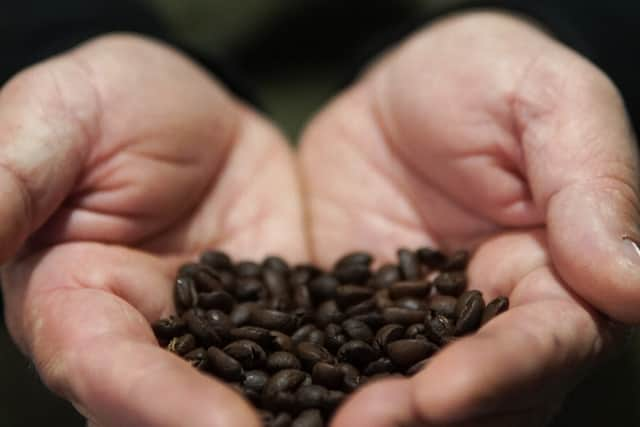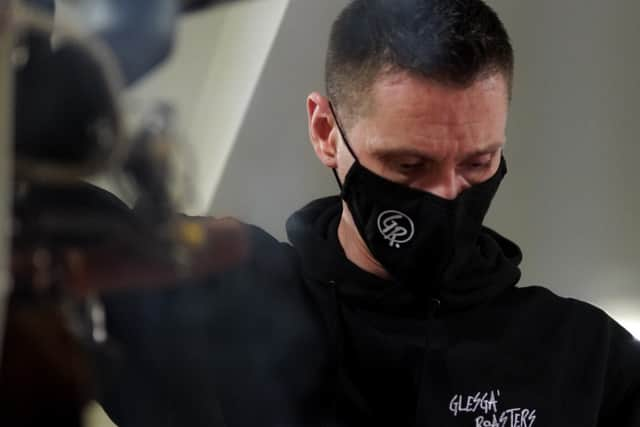The story behind Glesga Roasters coffee project which offers support and work for inmates
and live on Freeview channel 276
In 2020 James Faddes, pastor of Bishopbriggs Community Church on the outskirts of Glasgow, launched Glesga Roasters, a social enterprise, to help prisoners who are sick of their daily grind.
One of its first apprentices, Adam Inglis, of Glasgow, is now supporting the project by running prison workshops with James, helping his peers see the light.


Advertisement
Hide AdAdvertisement
Hide AdGlesga Roasters is producing high quality, local artisan, roasted coffee, traded directly and directly with coffee cooperatives in Rwanda as a tool for rehabilitation, mentoring, employability and community.
It has already grown from roasting 1kg to 5kg per day, or from 20kg to 100kg a month as the community buys into its goals.
James said: “We go into prison to stage workshops and I tell them ‘we source Rwandan Green or we could get our stuff from Colombia’.
“We cook it up, package it, negotiate a price and sell it into the community – and I can tell you it’s more lucrative than heroin.
Advertisement
Hide AdAdvertisement
Hide Ad“They may not appreciate it but they have the skills. They are numerate, they can manufacture product and they are used to trading.
“Becoming a roaster or barista is the game-changer, especially for people coming out of prison who have great skills but need the opportunity and for someone to have faith in them.
“There is so much potential out there if it is harnessed in the right way.”


Both men are able to empathise with the lives of the inmates and understand them well because their backgrounds have been just as difficult.
Advertisement
Hide AdAdvertisement
Hide AdJames was brought up in Irvine, a former bustling industrial new town which fell into deprivation and as his parents separated he found himself in trouble involving criminality and substance abuse.
A string of short-term prison sentences saw him sink further until he became a Christian.
Upon his release he relapsed, re-offended and was finally sectioned under the Mental Health Act, diagnosed with drug-induced psychosis and placed on medication.
He said: “It was a really bleak time and at 19 I was asking questions of life. I felt the world was against me and that I wasn’t worthy of life.”
Advertisement
Hide AdAdvertisement
Hide AdHis saviour came when the prison chaplain helped James connect with a local church which accepted and mentored him, leading to full time employment.
Now in his late 40s, with a wife and four children, James is the minister of Bishopbriggs Community Church and remains determined to help others with his latest venture.
It was a similar story for West Lothian-born Adam, who started experimenting with substances from the age of 11 and taking heroin from 14.
Struggling with dyslexia at school and having to cope with bereavements he admits going off the rails, his resulting violent outburst leading to terms in young offenders’ institutes and prison.
Advertisement
Hide AdAdvertisement
Hide Ad“I had a warped core belief system that descended into rampage,” he admits. “I was very troubled, wild, robberies and drug dealing were a lifestyle.
“I didn’t realise I had a choice and I ended up in a mental institution. I believed I was on a one-way ticket to hell. But my outreach worker was a cracking guy.”


He started working for Street Connect Glasgow, a charity that works with the marginalised and vulnerable, the route through which he connected with James and Glesga Roasters.
They planned to visit a Rwanda coffee plantation with members of Bishopriggs church, which works with local cooperatives in the stunning Karongi hillsides, but the global pandemic meant this was postponed.
Advertisement
Hide AdAdvertisement
Hide AdIt has not, however, stopped them developing a relationship with the Sholi plantation in Muhanga, resulting in its coffee becoming the main house roast.
“What we have is a recovery vehicle for people coming from the soil,” James said. “It’s a platform where we could develop skills in coffee roasting and brewing with the potential for roasters to enhance their employability.
“We also want to support coffee growers in Rwanda and across the world through ethical, direct trading. All of this is fused together by our passion for excellent coffee.”
They also hope to replicate the scheme across the UK and are in talks with other agencies who work with offenders.
Advertisement
Hide AdAdvertisement
Hide AdAdam added: “I love the project. I have just got married and my life has been completely transformed. I have been redeemed, feel elated and blessed to be able to give back.
“The skills are there either side of the fence but we need to draw people away from the darkness.”
Supermarket chain Aldi also heard about the initiative and has offered Glesga Roasters the chance to showcase its product and talents at some of its new store openings.
James said: “They have seen value not just in the product but also want to celebrate it as a platform on which to develop the skills of local people.
Advertisement
Hide AdAdvertisement
Hide AdThis is about the shoulder to shoulder mentoring of people with transferable skills.
“Aldi is giving them the chance to experience a real market place which is a huge boost. This is a chance to invite people into a project to which they can contribute something, show they have intrinsic value and have something to give.
“We are also working with the Scottish Barista Academy, who have been mentoring and supporting us, we are developing our own curriculum to take people to the next level and we are trying to replicate this around the country as a means to prevent them entering the revolving door of recidivism.”
Comment Guidelines
National World encourages reader discussion on our stories. User feedback, insights and back-and-forth exchanges add a rich layer of context to reporting. Please review our Community Guidelines before commenting.